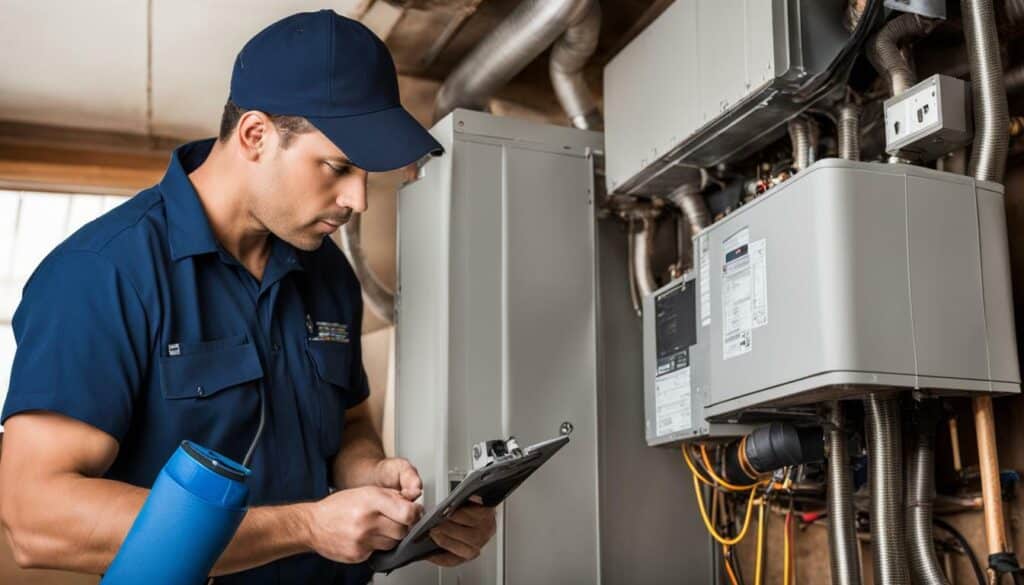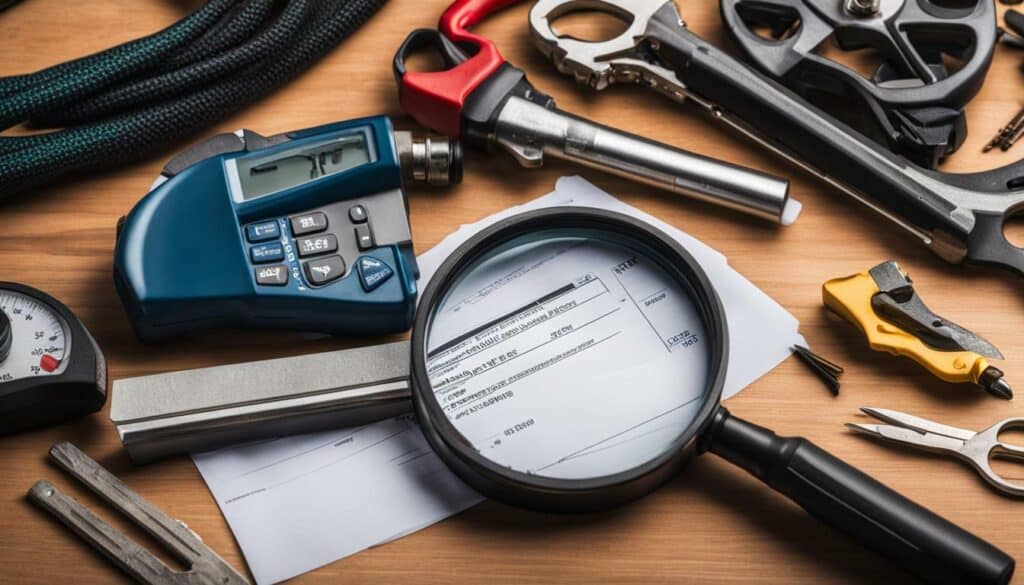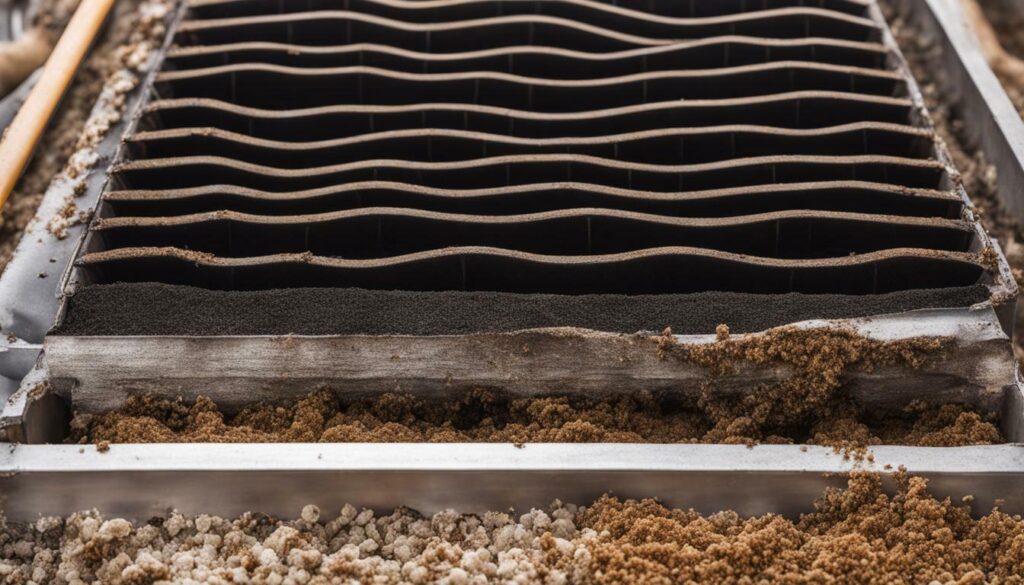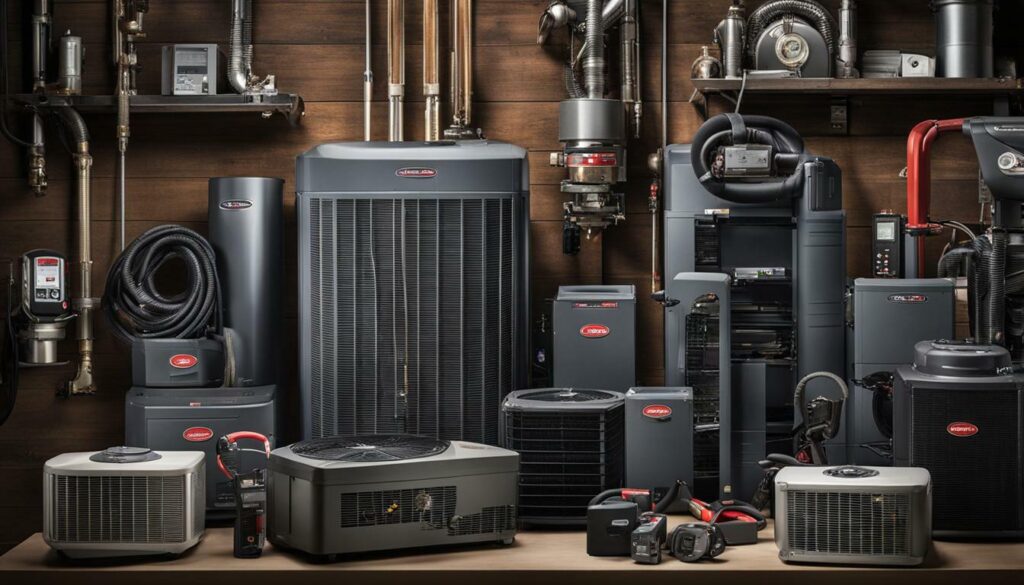An HVAC inspection is a comprehensive evaluation of your home’s heating and cooling systems to ensure they are running efficiently and effectively. It is important to have an HVAC inspection before moving into a new home to avoid unexpected expenses and stress. A standard home inspection is not enough to thoroughly evaluate an HVAC system, as home inspectors lack the expertise and tools of HVAC technicians.

During an HVAC inspection, the technician will inspect various components, including the thermostat, furnace cabinet, electrical components, blower wheel, ignition, exhaust venting and heat exchanger, gas and CO detectors, air conditioning system, evaporator coil, drain pan, condensation line, condenser and blower fan, refrigerant levels, and electrical components. The inspection will check for common issues such as gas leaks, cracked heat exchangers, exhaust venting problems, dying blower motors, and dirty coils.
Regular HVAC inspections can help prevent costly repairs, improve efficiency, ensure safety, and extend the lifespan of the system. It is recommended to have an annual HVAC inspection, preferably in the spring before the hot weather arrives. Overall, HVAC system inspection and maintenance are crucial for keeping the system running smoothly and reducing the risk of breakdowns and expensive repairs.
Key Takeaways:
- An HVAC inspection evaluates your home’s heating and cooling systems to ensure they are functioning properly.
- A standard home inspection does not provide a thorough assessment of HVAC systems.
- An HVAC inspection covers various components, including the thermostat, furnace, electrical components, and air conditioning system.
- It is recommended to schedule an annual HVAC inspection for optimal performance and efficiency.
Why HVAC Inspections Are Necessary
Regular HVAC inspections are essential for maintaining the efficiency and functionality of your heating and cooling systems. An HVAC inspection is an in-depth evaluation of all the working parts of your home’s HVAC system, including the thermostat, furnace, air conditioning unit, and ductwork. While a standard home inspection may cover some aspects of your HVAC system, it is not sufficient to thoroughly assess its condition. Home inspectors often lack the expertise and specialized tools of HVAC technicians, making it crucial to hire a qualified professional for a comprehensive inspection.
An HVAC inspection helps identify any issues or potential problems in your system before they become major headaches. The technician will thoroughly inspect each component, checking for common issues such as gas leaks, cracked heat exchangers, exhaust venting problems, dying blower motors, and dirty coils. By addressing these issues early on, you can prevent costly repairs and ensure the safety and longevity of your HVAC system.
Additionally, regular HVAC inspections can improve the efficiency of your system, saving you money on energy bills. During the inspection, the technician will assess the performance of your HVAC system and make any necessary adjustments to optimize its efficiency. This can help reduce energy waste and ensure that your system is operating at its peak performance.
It is recommended to have an HVAC inspection at least once a year, preferably in the spring before the hot weather arrives. This allows any issues or maintenance needs to be addressed before you rely heavily on your air conditioning system. However, depending on factors such as the age of your system, the climate in your area, and your usage patterns, you may need more frequent inspections. Consulting with a qualified HVAC technician can help you determine the ideal inspection schedule for your specific needs.
In conclusion, HVAC inspections are vital for the proper functioning and longevity of your heating and cooling systems. By investing in regular inspections, you can identify and address any issues early on, improve efficiency, and extend the lifespan of your system. Don’t wait until there’s a breakdown or a major problem; be proactive and schedule your HVAC inspection today.
What Happens During an HVAC Inspection?
During an HVAC inspection, a qualified technician will thoroughly assess various aspects of your heating and cooling systems to ensure they are in optimal condition. The inspection process involves examining each component of the HVAC system, from the thermostat to the condenser and blower fan. By conducting a comprehensive evaluation, the technician can identify any existing issues, potential problems, and areas that require attention.
One of the key areas inspected during an HVAC evaluation is the furnace cabinet. The technician will inspect the furnace for any signs of damage or wear, such as rust, cracks, or loose connections. They will also check the electrical components, blower wheel, ignition, exhaust venting, and heat exchanger to ensure they are functioning properly and pose no safety risks.
Another critical part of the inspection is assessing the air conditioning system. The technician will examine the evaporator coil, drain pan, and condensation line for any blockages or leaks that could impede the system’s performance. They will also check the refrigerant levels and electrical components of the condenser and blower fan to ensure they are operating efficiently.
To ensure your HVAC system is functioning safely and efficiently, the technician will inspect for common issues such as gas leaks, cracked heat exchangers, exhaust venting problems, dying blower motors, and dirty coils. If any issues are detected, the technician will provide recommendations for repairs or further maintenance.
Table: Components Checked During an HVAC Inspection
| Component | Inspection |
|---|---|
| Thermostat | Verify calibration and functionality |
| Furnace Cabinet | Inspect for damage, rust, and loose connections |
| Air Conditioning System | Check evaporator coil, drain pan, and condensation line |
| Refrigerant Levels | Measure and assess efficiency |
| Electrical Components | Inspect for any issues or malfunctions |
| Gas and CO Detectors | Ensure functionality and safety |
| Exhaust Venting | Check for proper ventilation and air flow |
| Heat Exchanger | Inspect for cracks or damage |
| Blower Fan | Assess performance and functionality |
By conducting regular HVAC inspections, you can prevent costly repairs, improve energy efficiency, ensure safety, and extend the lifespan of your system. It is recommended to have an annual HVAC inspection, preferably in the spring before the hot weather arrives. A thorough inspection by a qualified HVAC inspector will help keep your heating and cooling systems running smoothly, reduce the risk of breakdowns, and provide peace of mind.
Common Issues Found During HVAC Inspections
An HVAC inspection report may highlight several common issues that can affect the performance and efficiency of your heating and cooling systems. Identifying these problems early on can help prevent costly repairs and ensure that your HVAC system operates optimally. Here are some of the common issues that HVAC inspectors may discover during an inspection:
- Gas leaks: Inspectors will check for any gas leaks in your HVAC system, including connections, valves, and pipes. Detecting and addressing gas leaks promptly is crucial for safety and preventing potential hazards.
- Cracked heat exchangers: HVAC technicians will examine the heat exchanger for any cracks. A cracked heat exchanger can release dangerous carbon monoxide gases into your home and compromise the efficiency of your system.
- Exhaust venting problems: Clogged or incorrectly installed exhaust vents can hinder the proper ventilation of your HVAC system, leading to poor indoor air quality and reduced efficiency.
- Dying blower motors: The blower motor is responsible for circulating air throughout your HVAC system. If it is not functioning properly, it can result in inadequate airflow, uneven heating or cooling, and increased energy consumption.
- Dirty coils: Inspectors will check the evaporator and condenser coils for dirt, debris, and grime buildup. Dirty coils can restrict airflow, reduce cooling capacity, and put strain on your system, leading to decreased efficiency and potential breakdowns.
Addressing these issues promptly and having the necessary repairs or maintenance performed can help ensure that your HVAC system operates smoothly, efficiently, and safely. Regular HVAC inspections are an essential part of preventive maintenance and can help extend the lifespan of your heating and cooling systems, saving you money in the long run.
Table: Estimated Costs of Common HVAC Repairs
| Repair | Estimated Cost |
|---|---|
| Gas Leak Repair | $100 – $500 |
| Heat Exchanger Replacement | $1,200 – $3,000 |
| Exhaust Vent Cleaning | $150 – $300 |
| Blower Motor Replacement | $300 – $600 |
| Coil Cleaning and Maintenance | $100 – $250 |
Note: The above costs are approximate and can vary depending on factors such as the severity of the issue, labor rates, and the particular HVAC contractor.
The Importance of Regular HVAC Maintenance
Regular HVAC maintenance, in addition to inspections, plays a vital role in ensuring the long-term performance and reliability of your heating and cooling systems. While inspections focus on identifying existing issues, maintenance is proactive and helps prevent problems from occurring in the first place. By implementing a routine maintenance schedule, you can keep your HVAC system running smoothly and optimize its efficiency.
One of the key benefits of regular HVAC maintenance is improved energy efficiency. Over time, dust, dirt, and debris can accumulate in your system’s components, inhibiting proper airflow and reducing efficiency. Cleaning and replacing filters, as well as cleaning the coil, blower, and other parts, can significantly enhance your system’s performance and lower energy consumption. This not only saves you money on utility bills but also reduces your environmental impact.
Another important aspect of maintenance is the detection and prevention of potential issues. During maintenance visits, HVAC technicians can identify early signs of problems, such as worn-out parts, leaks, or abnormal noises. By addressing these issues promptly, you can prevent them from escalating into major breakdowns, which can be both costly and inconvenient. Regular maintenance also helps extend the lifespan of your HVAC system, ensuring that it operates efficiently for years to come.
When it comes to HVAC maintenance, it’s best to rely on the expertise of qualified professionals. They have the knowledge and experience to perform thorough inspections, identify underlying issues, and provide the necessary repairs or adjustments. Additionally, hiring a reputable HVAC maintenance service often comes with the added benefit of warranties or guarantees, giving you peace of mind and protection for your investment.
Why Choose Professional HVAC Maintenance
Professional HVAC maintenance offers several advantages over DIY approaches. HVAC technicians have the proper tools and equipment to perform comprehensive inspections and maintenance tasks. They are trained to identify potential hazards, such as electrical issues or gas leaks, ensuring your safety and the safety of your home. Moreover, professionals can provide expert advice and recommendations tailored to your specific HVAC system and home’s needs, helping you make informed decisions regarding repairs, upgrades, or replacements.
| Benefits of Professional HVAC Maintenance |
|---|
| Improved energy efficiency |
| Extended system lifespan |
| Early detection and prevention of issues |
| Professional expertise and advice |
“Regular HVAC maintenance is not just an expense; it’s an investment in the comfort and longevity of your home’s heating and cooling systems.” – HVAC expert
Overall, regular HVAC maintenance is essential for keeping your heating and cooling systems running smoothly, maximizing energy efficiency, and avoiding costly repairs. By prioritizing maintenance and partnering with qualified professionals, you can ensure a comfortable and reliable home environment throughout the year.
When and How Often Should You Schedule HVAC Inspections?
To ensure the best performance and longevity of your HVAC system, it is recommended to schedule a comprehensive inspection at least once a year, preferably in the spring. Regular maintenance is crucial for keeping your system running smoothly and reducing the risk of breakdowns and expensive repairs. By having an HVAC professional inspect your system annually, you can catch any potential issues early on and address them before they escalate.
Additionally, it is important to schedule an HVAC inspection when purchasing a new home. A standard home inspection may not thoroughly evaluate the HVAC system, as home inspectors lack the specialized expertise and tools of HVAC technicians. An HVAC inspection before moving in can help you avoid unexpected expenses and ensure that the heating and cooling systems are in good working order.
Depending on your specific circumstances, you may need to schedule more frequent HVAC inspections. For example, if you have an older system or live in an area with extreme weather conditions, it may be beneficial to have your HVAC system checked more frequently. An HVAC technician can provide personalized recommendations based on your needs and the condition of your system.
| Inspection Frequency | Guidelines |
|---|---|
| Annual Inspection | Recommended for most homeowners |
| Bi-annual Inspection | Recommended for older systems or homes with extreme weather conditions |
| New Home Purchase | Essential to ensure the HVAC system is in good working order |
Remember, regular HVAC inspections are an investment in the efficiency, safety, and longevity of your heating and cooling system. By prioritizing maintenance and staying proactive, you can enjoy a comfortable indoor environment and avoid costly repairs down the line.
How to Choose a Qualified HVAC Inspector
When choosing an HVAC inspector, it is essential to find someone who is knowledgeable, experienced, and reliable. Your HVAC system is a significant investment, and ensuring that it is properly inspected and maintained is crucial for its longevity and performance.
Here are a few factors to consider when selecting an HVAC inspector:
- Qualifications and certifications: Look for an inspector who is certified by reputable organizations such as the National Comfort Institute (NCI) or the National Association of Home Inspectors (NAHI). These certifications indicate that the inspector has undergone specialized training and meets industry standards.
- Experience: An experienced HVAC inspector will have a deep understanding of various HVAC systems and their intricacies. They will be able to identify potential issues and provide accurate recommendations for maintenance and repairs.
- Reviews and reputation: Look for reviews and testimonials from previous clients to get an idea of the inspector’s professionalism, reliability, and level of customer service. You can also ask for recommendations from friends, family, or local HVAC professionals.
“Choosing the right HVAC inspector is vital for the health and longevity of your heating and cooling system. A qualified inspector will have the expertise to identify potential problems and provide recommendations for maintenance and repairs.”
Additionally, it is essential to ensure that the HVAC inspector has liability insurance. This coverage protects you from any damages or injuries that may occur during the inspection process.
| Benefits of choosing a qualified HVAC inspector: |
|---|
| Accurate assessment of your HVAC system’s condition |
| Identification of potential issues before they become major problems |
| Professional recommendations for maintenance and repairs |
| Peace of mind knowing that your HVAC system is in good hands |
By taking the time to choose a qualified HVAC inspector, you can ensure that your heating and cooling system receives the care it deserves. Remember to do your research, ask for credentials, and read reviews to make an informed decision. Your HVAC system will thank you!
The Cost of HVAC Inspections
The cost of an HVAC inspection can vary depending on factors such as location, the size of the system, and additional services required. On average, homeowners can expect to pay between $100 and $300 for a comprehensive HVAC inspection. However, this cost can be well worth it considering the potential savings and benefits associated with a thorough evaluation of your heating and cooling system.
When determining the cost of an HVAC inspection, one of the main factors to consider is the size of your system. Larger systems with more components may require more time and expertise from the HVAC inspector, leading to a higher overall cost. Additionally, the location of your home can also affect the price, as labor and service fees can vary between different regions.
While the base cost of an HVAC inspection typically covers the examination of essential components such as the thermostat, furnace, and air conditioning system, additional services may be recommended or required. These can include duct cleaning, filter replacement, or the testing of gas and carbon monoxide detectors. It’s important to discuss these potential extras with your HVAC inspector to get a clear understanding of any additional costs.
Investing in regular HVAC inspections may seem like an additional expense, but it can save you money in the long run. By identifying problems early on, you can prevent major breakdowns that require costly repairs or even full system replacements. Additionally, a well-maintained HVAC system operates more efficiently, resulting in lower energy bills. So, while the cost of an HVAC inspection may vary, it’s a worthwhile investment to ensure the comfort, safety, and longevity of your home’s heating and cooling systems.
Conclusion
Regular HVAC inspections are crucial for ensuring the optimal performance, efficiency, and longevity of your home’s heating and cooling systems. An HVAC inspection is an in-depth evaluation of all the working parts of your HVAC system, including the thermostat, furnace, electrical components, and air conditioning system. It goes beyond a standard home inspection, which may not thoroughly assess the complex HVAC system.
During an HVAC inspection, a qualified technician will inspect various components, such as the blower wheel, ignition, exhaust venting, heat exchanger, and refrigerant levels. They will also check for common issues like gas leaks, cracked heat exchangers, and dirty coils. By identifying these problems early on, HVAC inspections can help prevent costly repairs, improve the system’s efficiency, ensure safety, and extend its lifespan.
It is recommended to have an annual HVAC inspection, preferably in the spring before the hot weather arrives. This timing allows for any necessary maintenance or repairs to be done before the heavy usage during the summer months. By staying proactive with regular HVAC inspections, you can enjoy a comfortable and efficient home while minimizing the risk of breakdowns and expensive repairs.
Don’t underestimate the importance of HVAC system inspection and maintenance. By investing in the care of your heating and cooling systems, you can ensure they operate smoothly for years to come, providing you with a comfortable and welcoming environment all year round.
FAQ
Why is an HVAC inspection necessary?
An HVAC inspection is necessary to evaluate the working parts of your heating and cooling systems, prevent unexpected expenses, and ensure peace of mind.
What happens during an HVAC inspection?
During an HVAC inspection, a technician will thoroughly evaluate components such as the thermostat, furnace cabinet, electrical components, blower wheel, ignition, exhaust venting, and more.
What are some common issues found during HVAC inspections?
Common issues found during HVAC inspections include gas leaks, cracked heat exchangers, exhaust venting problems, dying blower motors, and dirty coils.
Why is regular HVAC maintenance important?
Regular HVAC maintenance helps prevent costly repairs, improves efficiency, ensures safety, and extends the lifespan of the system.
When and how often should I schedule HVAC inspections?
It is recommended to have an annual HVAC inspection, preferably in the spring before the hot weather arrives, to ensure optimal performance and catch any potential issues.
How do I choose a qualified HVAC inspector?
When choosing an HVAC inspector, consider their certifications, experience, and customer reviews to ensure they are qualified and reliable.
What is the cost of an HVAC inspection?
The cost of an HVAC inspection can vary depending on factors such as the size of the system and the specific services included. It is advisable to obtain quotes from reputable HVAC inspectors in your area.










